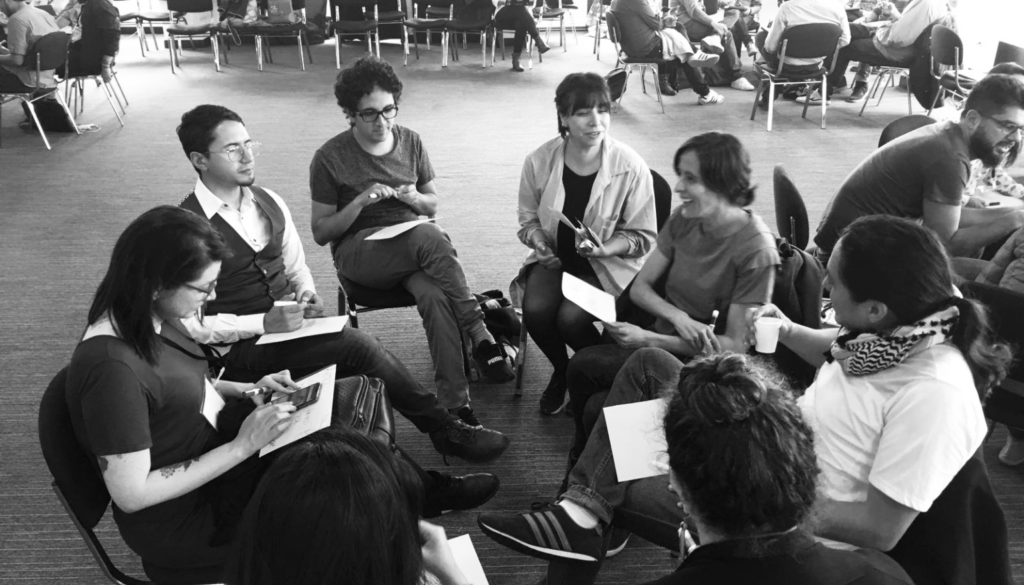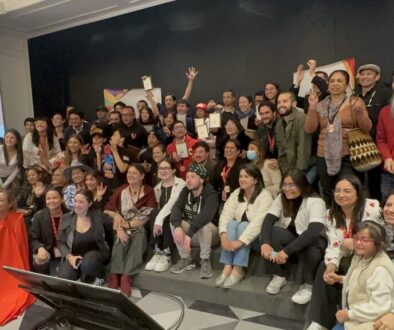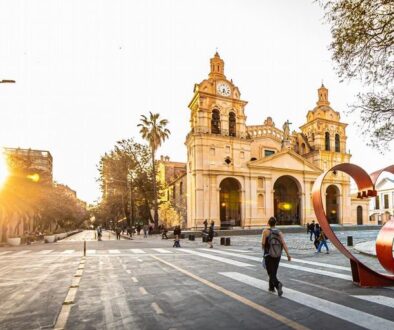Bridges to heal our democracies: Strategies for citizens to occupy and inhabit politics
In Colombia, talking about democracy means facing a crisis of trust, governance and representation in electoral politics and institutions. It means facing a reality of systematic violence, cross-fires and ideological stereotypes that have made Colombian history difficult to assimilate. Asking ordinary people if they trust in politics or political figures, is to receive comments such as “it doesn’t matter who is left, they are all going to steal”, “they are cut from the same cloth” and “why am I going to vote if none of these people represent me?”
According to Edelman’s Trust Barometer study, the government is the institution that Colombians trust the least, and they find that “leaders cannot be trusted to do the right thing”, on the contrary, they are suspected of lying and misinformation, especially when it comes to political and business leaders.
But why is it that Colombian political power is so distrusted by citizens? At the Extituto de Política Abierta, an organisation that works to strengthen leadership and collective processes so that they can influence, occupy and inhabit politics, we make the following reflection: Citizens do not feel represented because there is no citizenry in power, there are no women, there are no LGBTIQ++ people, there are no black, afro, raizal, palenquero people, there are no indigenous and peasant communities, there are no people with disabilities, there are no young people and there are no victims of the armed conflict. They are not there, nor is there any discussion of what these people need and are interested in.
In a country where politics is not occupied by those who have historically been “ignored”; where social, political, economic and violent barriers do not allow the voice of the people to reach decision-making spaces and which, on the contrary, silences social leaders, 1270 leaders have been assassinated five years after the signing of the Peace Agreement. So how can Colombians feel represented?
Strengthening leadership and collective processes is our commitment, strengthening those who want to occupy politics and at the same time seeking to ensure that those who have historically worked for the territories continue to come together to take their agendas to decision-making spaces. This is how Occupy Politics was born.
What are we looking for with Occupy Politics?
The objective we propose is to confront the crisis of representation by transforming the traditional dynamics of electoral politics, and we achieve this through two essential elements. The first is the strengthening of emerging leaderships so that new people can reach decision-making positions. For the last legislative elections, we accompanied the campaign processes of 81 candidates for the House of Representatives through personalised mentoring and collective workshops to strengthen campaign and political communication strategies.
Eighty-one candidates from 17 departments and six Special Transitory Peace Circumscriptions participated in the process, of which 21 were elected on 13 March. Among them were eight women, one indigenous woman, four LGBTIQ+ people, three young people under the age of 28 and two victims of the armed conflict. These people are a sample of the historic renewal of the Congress of the Republic, and with them we assume the challenge of working for the fulfilment of the legislative duty in a more transparent and participatory way.
The second essential element of Occupy Politics is the co-construction of citizens’ agendas so that new ideas and proposals reach the stages of debate. We believe that the feeling of disconnection between representatives and those they represent is not only due to the quality of the former, but also to the quality of the debates that take place, or the absence of debates on issues relevant to civil society. For this reason, we believe it is essential that in electoral processes citizens take an active role in creating and proposing ideas for dialogue with those who assume the candidacy; so that, regardless of who is elected, citizens’ demands are heard and brought to public discussion.
In the last version of Occupy Politics, we worked with more than 70 civil society organizations to build and present proposals to the candidates around six agendas prioritized by the citizens themselves: environment, gender, peace-building, disability, human rights and youth. We carried out a process of accompaniment with the organizations through which we generated networks, strengthened skills and facilitated spaces for dialogue. In all the territories where the project was present, we held meetings with organizations with similar experiences so that they could build links that would allow them to give greater scope to their work. At the same time, with the support of experts in legislative issues, we transferred tools that allowed them to better understand how to present and mobilize their proposals in the legislative context. Finally, we facilitated ten spaces for dialogue in which citizens presented the co-constructed proposals to the candidates and around which they discussed and made commitments to link these ideas to their campaigns.
With the elections over and the new Congress of the Republic in office, we face the great challenge of effectively implementing the proposals and ideas of the citizenry in the debates in the House of Representatives. Bearing in mind that the spaces for dialogue were created within the framework of the campaign, and that the conversation around citizens’ ideas remains in the form of proposals, the role of an active citizenry that permanently accompanies the transition of these ideas and proposals into bills becomes extremely relevant.
This year, 21 candidates participated in the Occupy Politics campaign for the House of Representatives, and while the inevitable call to participating organizations and citizens in general is to oversee and monitor that the representatives comply, today we dare to extend an additional invitation. Representatives must work together to contribute and collectively build the laws we need, based on the ideas we shared in the campaign. Extituto will continue to work to increase and improve the quality of effective advocacy in the House of Representatives and we hope to be able to count on the collaboration of many different people.
The experiences of a programme like Occupy Politics reaffirm the need for political platforms to transform, renew and heal our democracies. These projects serve as bridges to strengthen and bring citizens closer to those places of power that we saw as unattainable and to be able to inhabit politics.
Today Extituto de Política Abierta, one of the organisations behind the “Ocupar La Política” process, is part of the International Consortium of Localities in Action (CILA) and seeks to continue strengthening processes of political occupation in Colombia and Latin America. Find out more by clicking here.
Written by:
Adelaida Roa Roa: Feminist woman in construction, deconstruction, constant questioning and learning. She studied law and specialized in constitutional law. She worked as a researcher at the Observatory of Restitution and Regulation of Agrarian Property Rights at the University of Rosario, as a legislative assistant in the House of Representatives and now as Project Coordinator at the Open Policy Institute.
Andrea Cervera Robles: Social Communicator – Journalist. Feminist, writer, photographer, researcher and creator of digital content. She is currently communications coordinator at the Open Politics Institute. She has co-written the books “Democracia en 3 actos” (2020) and “Ciudadanía permanente para la incidencia política (2021) and is the photographer of the album “Retratos de una ciudadanía permanente” (2022).
This article was previously published in Animal Político on 24 August 2022.




